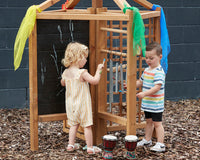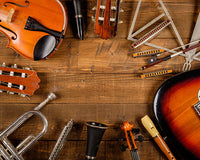We've all had that dream of becoming famous rock stars worshipped by millions and swimming in cash.
Some have secretly hoped to become a piano protege, touring the world and serenading thousands in romantic cities.
Others have even wished to start a solo career, just you and your guitar in front of millions of adoring fans all vying for your attention all because of the music you create.
Admit it, one of those scenarios has crossed your mind at one point but you dismissed it thinking it'll never come true or it's already too late for you. You might be right, but who cares? How about just doing it for the sheer enjoyment of creating music? Besides, that's where all the great artists started: They played for the sheer enjoyment of playing. But before you whip out your credit card and order a baby Grand Piano or a Fender Electric Guitar, here are a few tips in choosing the right instrument for you.
1. Do your Research
Buying an instrument is a big commitment, especially if you're going to be spending a few hundred bucks on it. So before you run to the nearest music store, do some reading. Consider what kind of instrument you'd like to start first. Maybe something that's easy to learn and master? For example, the guitar is fairly common with a lot of tutorials online that can help you learn the basics quickly. The same goes for the piano. Both these instruments have the versatility and the range to let you express your feelings through music.

2. Selecting the right Instrument
So, you've never actually played an instrument in your life? That's okay. The good news is it's never too late to start. Selecting the right musical instrument for yourself can be tricky. You don't want to spend money on something that will end up tucked away in the attic but you would also want a good quality instrument to achieve nice sound and to motivate you to continue practising. You have the option to buy as many kinds of cheap instruments as you want then only getting the good kind for the ones you feel comfortable playing. Alternatively, you can save all that money and just borrow from friends and family. Chances are, you know someone who plays an instrument... They could even be your first music teacher, if you ask nicely.
3. Consider the Price
In an article about purchasing a musical instrument, it is impossible not to talk about price. Instruments can range from cheap and cheerful all the way up to works of art made by artisans. Obviously, as a beginner, you would want to put off buying the expensive professional models until you've truly mastered the instrument. It is typical for beginners to go for a low to mid-range instrument. For most this is enough to get you started and comfortable playing the instrument. Once you're proficient enough to play it, then you can start thinking about getting a higher-end kind.

4. It's all about the feel
Many musical instruments are bought online these days. However, for your first ever instrument it can be nice to do it the old fashion way and visit a music store. Not only will experienced staff be able to assist you in selecting the right one for you, but you'll also be able to handle and test them for yourself. There's no replacing the tactile connection on a good instrument.
5. Start small
Now you have your instrument. Visions of playing in big theatres and music hall flash through your head. Shake that image off and get down to business. Start small, start simple and work your way up. There are numerous free online tutorials available online and many of them for beginners. Make use of all resources.

6. Practice, Practice, Practice
There is no stressing this enough: The only way for you to be great at your craft is to keep at it relentlessly. There's a fine line between mediocrity and greatness and that line is your commitment to practice over and over again. Once you think you've mastered it, practice a little more just to be sure.
Like what you've read from Lily?
You can see more of her work at MandolinBrands, an information site that provides down-to-earth information on the most popular brands of mandolins.























